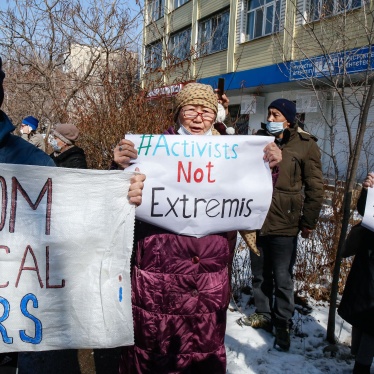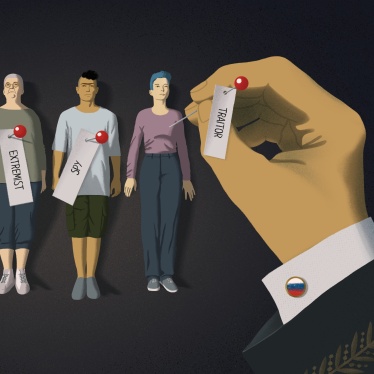(Berlin) – At least eight journalists and three human rights defenders are in jail, and freedom of expression is severely limited in Azerbaijan, the host of the upcoming United Nations-sponsored Internet Governance Forum (IGF), Human Rights Watch said in a briefing paper published today. The government should use this opportunity to free imprisoned journalists and activists, decriminalize libel, and end the blanket ban on opposition rallies in the center of the capital, Baku.
The Internet Government Forum is planned for November 6 to 9, 2012. The annual meeting convened by the United Nations Secretary-General brings together governments, civil society, and others as equal partners to discuss public policy issues related to the Internet. This year’s theme is the role of Internet governance in promoting development.
“The Internet Governance Forum’s theme recognizes the role Internet technologies play in enabling human development,” said Giorgi Gogia, senior South Caucasus researcher at Human Rights Watch. “However, to fully realize this potential, Azerbaijan should protect its citizens’ ability to express themselves online and off without fear of reprisal.”
The 10-page briefing paper describes Azerbaijan’s record of imprisoning journalists, human rights defenders, and political opposition activists, in most cases on bogus criminal charges, in apparent retaliation for their investigative journalism or political activism.
As the formal convener of the Internet Governance Forum, UN Secretary-General Ban Ki-moon should remind the Azerbaijan government of its human rights obligations, Human Rights Watch said. Human Rights Watch also called on governments attending the forum to raise freedom of expression concerns directly with the Azerbaijani authorities.
“The forum’s mandate includes strengthening civic engagement in Internet governance,” Gogia said. “The best way for the Azerbaijani government to do this is by improving human rights.”
Among the journalists behind bars in Azerbaijan is Avaz Zeynalli, editor of Khural, a newspaper known for its tough criticism of public officials. Zeynalli’s reporting implicated in corruption a member of parliament from the ruling party who pressed dubious extortion charges against him. She subsequently resigned from her seat as a result of a separate corruption scandal. Zeynalli was arrested in October 2011 and is currently on trial.
One of the human rights defenders in prison is Vidadi Isganderov, a lawyer by training who was sentenced to three years in prison in August 2011. After running for office in the November 2010 parliamentary elections, Isganderov submitted a complaint to the authorities alleging vote rigging in his district. Despite video footage and other materials that supported Isganderov’s allegations, the authorities failed to investigate. Instead, they brought charges against him, and he was found guilty of interfering with the election.
“The cases against Zeynalli and Isganderov send chilling messages to journalists and human rights activists who dare to use media, including social media, to express their concerns about government actions,” Gogia said. “As a sign of commitment to the IGF’s human development focus, the government should release Zeynalli, Isganderov, and others who have been targeted for nothing else but speaking their minds.”
Azerbaijani authorities have also failed to hold accountable the people responsible for assaults and other attacks and harassment against journalists. The briefing paper describes how Idrak Abbasov, a journalist for the Azerbaijani media watchdog Institute for Reporters’ Freedoms and Safety, was attacked in broad daylight by Azerbaijan State Oil Company (SOCAR) security guards when he was filming house demolitions. Abbasov temporarily lost consciousness and was hospitalized with multiple bruises and hematomas. SOCAR blamed Abbasov for instigating the attack, and the authorities failed to bring anyone to justice for the beating.
Azerbaijani authorities should conduct prompt, thorough, and transparent investigations into all cases of harassment, intimidation, violence, and threats of violence against journalists, Human Rights Watch said. The investigations should bring to justice the individuals implicated in those actions.
Azerbaijani authorities limit freedom of expression in other ways, including by breaking up peaceful protests, often with violence, and arresting and sentencing peaceful protesters, organizers, or participants. Activists often use social media to organize peaceful demonstrations. Since early 2006, authorities have not authorized a single opposition protest in the center of Baku. The authorities force all demonstrations into designated zones on the outskirts of the city.
As recently as October 20, 2012, police rounded up dozens of protesters in an unsanctioned rally in central Baku, roughing them up and forcing them into police cars and buses. Many were fined and released, but at least 13 were sentenced to up to 10 days of detention on misdemeanor charges.
Such a blanket ban on assembly in central Baku goes against Azerbaijan’s international obligations to respect freedom of assembly and expression, Human Rights Watch said. The authorities should immediately remove the ban and allow peaceful protests without undue interference by the authorities.
“With the 2012 Eurovision Song Contest in Baku in May, this is the second time in six months that Baku is hosting a major international event,” Gogia said. “The government shouldn’t just try to use those events to enhance its public image. It should uphold and respect the values those events are designed to promote.”






